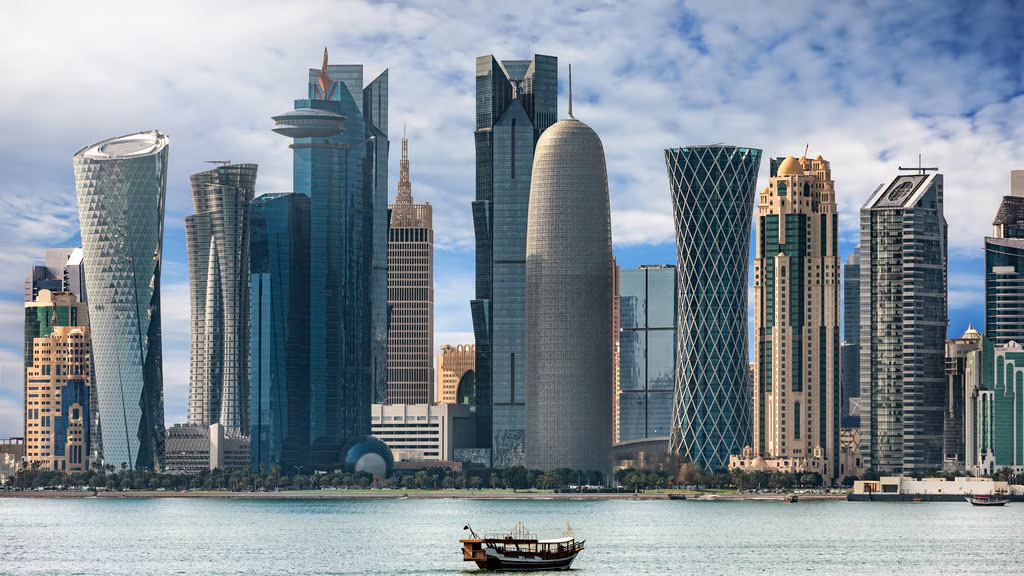How Herballife consider as No. 1 Nutrition food in the World
November 2, 2025
November 4, 2025,6:35:33 PM

Qatar is a small, oil-rich country located in the Middle East, bordering Saudi Arabia to the south, the Persian Gulf to the west, and the United Arab Emirates to the southeast. Here are some interesting facts about Qatar:
![]()
Geography and Climate: -
Qatar is a peninsula, with a total area of approximately 11,000 square kilometres (4,250 sq mi). - The country has a hot desert climate, with very little rainfall and high temperatures throughout the year. - The capital city, Doha, is a modern city with a population of over 2.5 million people.
![]()
Economy: -
Qatar has the highest per capita income in the world, thanks to its vast oil and natural gas reserves. - The country's economy is heavily dependent on oil and gas exports, but it is also diversifying into other sectors such as finance, tourism, and logistics. - Qatar is home to the Qatar Stock Exchange (QSE), which is one of the largest stock exchanges in the Middle East.
Culture: -
Qatar is an Islamic country, with the majority of the population being Muslim. - The country has a rich cultural heritage, with a blend of traditional and modern influences. - Qatar is known for its vibrant arts and culture scene, with numerous museums, galleries, and festivals throughout the year.
![]()
History: -
Qatar has a long and complex history, with evidence of human habitation dating back to the Stone Age. - The country was an independent state until the 19th century when it was occupied by the Al Thani dynasty. - Qatar gained independence from the United Kingdom in 1971 and has since become a major player in regional and international affairs.
![]()
Tourism: -
Qatar is a popular tourist destination, with attractions such as the Museum of Islamic Art, the Souq Waqif, and the Katara Cultural Village. - The country is also home to several world-class sports facilities, including the Khalifa International Stadium and the Qatar Sports Club. - Qatar is a major hub for business and commerce, with numerous international conferences and exhibitions held throughout the year.
![]()
Infrastructure: -
Qatar has invested heavily in infrastructure development, with major projects such as the Doha Metro, the Qatar Rail, and the Hamad International Airport. - The country has a well-developed transportation network, with several major highways and a comprehensive public transportation system. - Qatar is also investing in renewable energy, with a goal of generating 20% of its electricity from solar power by 2030.
![]()
Education: -
Qatar has a well-developed education system, with several world-class universities and research institutions. - The country is home to several international schools, including the Qatar International School and the British International School. - Qatar is also investing in education and training programs, with a focus on developing the skills and competencies of its workforce.
![]()
Healthcare: - Qatar has a well-developed healthcare system, with several world-class hospitals and medical facilities. - The country is home to several international medical centres, including the Hamad Medical Corporation and the Qatar Health Authority. - Qatar is also investing in healthcare and medical research, with a focus on developing new treatments and technologies.
![]()
Qatar is indeed one of the richest countries in the world, thanks to its vast oil and natural gas reserves. Here are some facts that demonstrate Qatar's wealth: -
Per capita income: Qatar has the highest per capita income in the world, with a GDP per capita of over $69,000 (2022 est.). - Oil and gas reserves: Qatar has the third-largest natural gas reserves in the world, with an estimated 25 trillion cubic meters (880 trillion cubic feet). - Oil production: Qatar is the world's largest exporter of liquefied natural gas (LNG) and has a significant oil production capacity, with an estimated 1.8 million barrels per day (b/d). -
![]()
Wealth fund: Qatar has a sovereign wealth fund, the Qatar Investment Authority (QIA), which manages a portfolio of over $450 billion in assets. - Real estate: Qatar has a thriving real estate market, with some of the most expensive properties in the world, including the Burj Khalifa, the tallest building in the world.
![]()
- Infrastructure:
Qatar has invested heavily in infrastructure development, including the construction of the Doha Metro, the Qatar Rail, and the Hamad International Airport. Qatar's wealth has enabled the country to: - Develop world-class infrastructure: Qatar has invested heavily in infrastructure development, including transportation networks, energy systems, and telecommunications. -
![]()
Support education and research: Qatar has established several world-class universities and research institutions, including the Qatar University and the Qatar Science and Technology Park. - Promote arts and culture: Qatar has a vibrant arts and culture scene, with numerous museums, galleries, and festivals throughout the year. - Support international development: Qatar has a significant role in international development, with a focus on providing aid and assistance to countries in need.
![]()
The population of Qatar is approximately 2.6 million people, with only 313,000 of them being Qatari citizens, and the remaining 2.3 million being expatriates and migrant workers. This is according to the latest available data from 2017. The country has a relatively small indigenous population, but a large and diverse expat community.
![]()
The population is expected to continue growing due to the country's economic development and infrastructure investments. It's worth noting that Qatar has a unique demographic profile, with a high proportion of expatriates and a relatively low proportion of native-born citizens. This is due in part to the country's history of immigration and its role as a major hub for international business and trade. The country's population is also expected to continue shifting in the coming years, with a growing proportion of young people and an increasing demand for skilled workers.
© 2024 Iconsofindianbusiness.com. All Right Reserved.